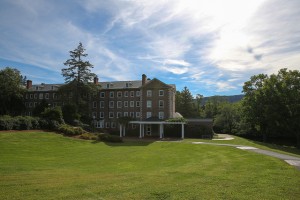 Food service seems like such a simple thing. Walk into the Birch Dining Commons during any mealtime and the options seem endless: salads, hot entrees, made-to-order options at the grill, a deli bar, a pasta bar, and several options for dessert.
Food service seems like such a simple thing. Walk into the Birch Dining Commons during any mealtime and the options seem endless: salads, hot entrees, made-to-order options at the grill, a deli bar, a pasta bar, and several options for dessert.
Yet, behind the scenes, quite a lot of thought must go into every dish.
After all, the options should be fresh, locally sourced, and of the highest quality. They should meet strict nutritional and dietary standards—food allergies are always a concern—while also being incredibly tasty, so that what’s served on campus can compete with options at area restaurants. There should also be dishes that adhere to vegetarian, vegan, and other requirements, and enough variety to satisfy the pickiest eater.
Meeting all of those various requirements is a tall order for any dining staff, and it’s only been getting harder—particularly one without a dietician, nutritionist, computerized menu, or national-level purchasing power.
“There are many complications involved with managing a dining services in the 21st century,” said Williston’s CFO Charles McCullagh. “You have so many more things to consider.”
With that in mind, over the past year, Williston Northampton administrators began a search for a new dining services provider, one that catered specifically to independent schools and small private colleges.
This spring, they chose Maryland-based SAGE Dining Services, which has some 225 clients nationwide, including such schools as Kingswood-Oxford, St. George’s School, and Choate Rosemary Hall. The SAGE philosophy is two-fold: to make everything from scratch, and to make dishes in small batches, so the first serving is the same as the last.
Mr. McCullagh said the school chose SAGE for their decades of experience, excellent reputation, and approach to food. Mr. McCullagh, who also worked with the company during his time at Christchurch School in Virginia, said that such a switch would give the school access to additional levels of service that weren’t possible without added support.
“Some changes people will notice right out of the gate; some will be really subtle,” Mr. McCullagh said.
Head of School Robert W. Hill III said he was excited about the advancements SAGE could bring to the school, such as providing detailed nutritional information online, as well as their planned improvements for the dining hall, like new signage and, eventually, renovations to the dining hall.
“The first thing to know about this upcoming change and transition is that we keep the same incredibly friendly dining services staff who are so integral to our school community.” Mr. Hill noted. “I am enthusiastic about the possibilities that will evolve. Sage has a strong reputation among boarding schools for understanding our unique needs.”
In July, SAGE CFO and General Counsel Tina Rodriguez was on campus to welcome the Williston staff, all of whom will have a job with SAGE and will retain their existing salaries and benefits.
“How we define what we do at SAGE—it’s not just food,” she told them. “It’s about the look, the smell, the experience. That’s SAGE. It’s an experience.”
Ms. Rodriguez said later that she was excited to start working with the Williston Northampton staff and described the transition as “the start of a great relationship.”
“Our philosophy is simple: we’re about real, made-from-scratch food,” she wrote in an email. “We use fresh, locally sourced ingredients whenever possible. Every student, no matter if they are the first or last in line, is assured a quality meal.”


About time they fix the dinning hall food.